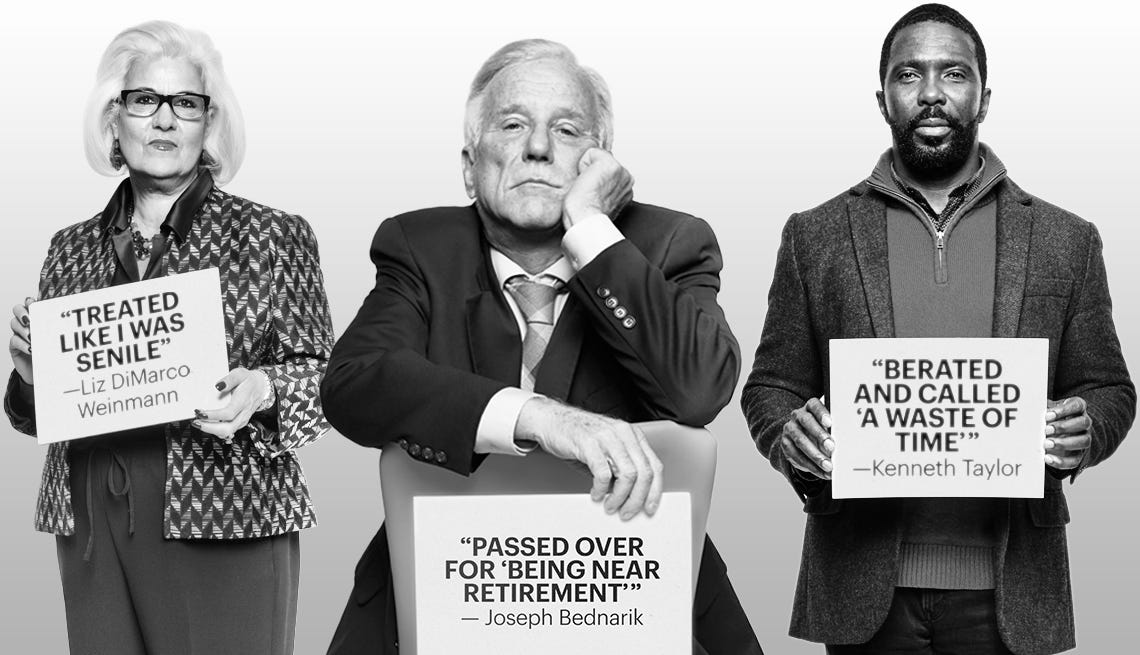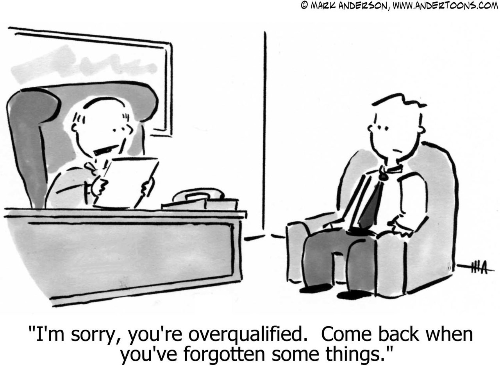
The Age Factor: Confronting Ageism in the “Overqualified” Argument
Picture this: You're sifting through a stack of résumés and a candidate with an impressive track record catches your eye. But a nagging voice whispers, "They're overqualified."
Is this a warning signal, or could it be a deeply ingrained prejudice we've yet to confront?
Welcome to the grey area of the job market: ageism and the "overqualified" conundrum.
In this post, we're cracking open the vault on ageism, pulling back the curtain to reveal the impact of this bias in recruitment and workplace dynamics. We'll dissect the implications of labeling someone as "too experienced," the hidden strengths they bring to the table, and the strategies for harnessing this untapped potential in your organisation.
As we peel back the layers, you'll gain insights into creating a work culture that not only recognises but celebrates the value of experience. Let's embark on this journey with eyes wide open, challenging outdated notions and embracing a future where "overqualified" is seen for what it truly is—a badge of honor.
So buckle up and prepare to shift your perspective. You're not just reading another blog post; you're stepping into a movement that champions the seasoned professional. And who knows? By the end of this, "overqualified" might just become the most sought-after qualification in your hiring lexicon. Ready to challenge the status quo? Let's dive in.
Understanding Ageism and Overqualification
Ageism in the workplace is a subtle form of discrimination that stealthily sidelines senior professionals. Defined as prejudice or discrimination based on a person's age, it's a barrier that often intersects with the concept of overqualification—the perception that a candidate possesses more experience or education than a job requires. While age should be a badge of expertise, it becomes a double-edged sword when accompanied by the 'overqualified' label during the hiring process.
This link between ageism and overqualification creates a paradox where seasoned professionals are both sought after for their wisdom and yet, paradoxically, cast aside for being too rich in experience. A study published in the Journal of Applied Psychology suggests that overqualified candidates are frequently passed over due to fears they lack long-term commitment—fears that disproportionately affect older applicants.
Furthermore, ageism may not always be a conscious decision; subconscious biases can lead to the dismissal of older candidates under the presumption they're overqualified, when in fact, they might be seeking a change in career pace or intentionally applying for a role with a scope that matches their desired lifestyle.
Before we delve deeper, let's pause and acknowledge the dilemma: a wealth of experience should be a powerful asset, not a reason for exclusion. As we bridge the gap between ageism and overqualification, we should aim to shine a light on the challenges senior professionals face and celebrate the unparalleled value they bring to the workforce. Let's flip the script from viewing 'overqualified' as a barrier to seeing it as an indication of a candidate who can offer any team a supply of knowledge and maturity. Now, let's explore how to dismantle these barriers and foster a hiring environment that is genuinely age-inclusive.
The Misuse of 'Overqualified' in Hiring Decisions

The term 'overqualified' often serves as a coded language for age bias, a convenient but damaging shortcut that can unfairly derail the careers of seasoned professionals. When this label is applied, it's not just about the surplus of skills; it can be a subtle nod to the candidate's age, suggesting they might not mesh with the company's culture or pace—assumptions based not on fact, but on stereotype. It's a form of exclusion that looks benign on the surface but cuts deep, leaving a swath of undervalued talent in its wake.
Let's consider John, a veteran in his field, who's turned away from a role because his robust resume supposedly signals he'll soon be bored and resign—yet no one has asked John about his motivations or career goals. Or Mary, who's told she's too qualified for the position, while behind closed doors, the term masks concerns about her fitting into a 'young' workplace. These are not just hypothetical scenarios; they're real stories that unfold in interview rooms more often than we'd like to admit.
Legally, such hiring practices tread on thin ice, brushing dangerously close to age discrimination as outlined in the Age Discrimination Act 2004 (ADA). Ethically, it's a minefield, undermining the principles of diversity and inclusion that progressive companies strive to embody. Every time a skilled candidate is dismissed under the guise of being overqualified, we chip away at the bedrock of fair employment practices.
Wrapping this section up, let's remember when we allow 'overqualified' to become a smokescreen for ageism, we're not just sidelining valuable professionals—we're also questioning the very ethics that underpin our businesses. As we move forward, it's crucial to transform hiring norms and champion practices that embrace the full spectrum of talent, regardless of age. Now, let’s dive into how the value of experience can be repositioned to cast these candidates not as risks, but as assets to our teams.
The Value of Experience: Countering the 'Overqualified' Narrative
Incorporating experienced, older candidates into the workforce is more than an exercise in corporate social responsibility; it's a strategic move that pays dividends in business performance. These candidates often demonstrate a level of dedication and work ethic that is born out of years in the workforce, translating into fewer absences and a reliability that businesses can count on. Their presence can lend a sense of stability and resilience to a team, qualities especially appreciated in high-pressure environments or during economic downturns.
Moreover, seasoned professionals come equipped with a robust network of industry contacts, providing an invaluable resource for business development and strategic partnerships. This network, coupled with their expansive knowledge, not only enhances innovation but can also open doors to new market opportunities previously unexplored.
Take, for example, companies like Barclays and BMW who have pioneered programs focused on attracting and retaining older employees. They're not just talking the talk; they're walking the walk—and reaping the rewards. These organisations report boosts in productivity, a mix of generational perspectives that spark creativity, and a loyalty that transcends the age spectrum, resonating across the entire company.
Let's not forget that the argument in favor of hiring experienced candidates is not just anecdotal; it's supported by research indicating that teams with a mix of ages are more innovative and productive. Businesses that have recognised and leveraged the value of their older employees often outperform their competitors, illustrating that experience is not a liability but a powerful asset for driving business success.
Strategies for Senior Professionals

Senior professionals can transform the challenge of being seen as 'overqualified' into an opportunity by adopting a set of strategic actions. When crafting your resume or preparing for an interview, focus on the narrative of how your extensive experience is not just a chronicle of past duties, but a source of insights poised to address current industry challenges.
Refine your Resume: Trim any excess that doesn't serve your narrative of alignment with the company's goals. Highlight roles and projects where you've actively driven change or innovation, linking these experiences to potential benefits for the new employer. For instance, if you've led a team through digital transformation in the past, outline how this could accelerate the prospective company's technological adoption.
Utilising Storytelling within your interview: In the interview, tell compelling stories that illustrate your problem-solving skills and adaptability instead of simply listing past achievements. Describe how you've navigated industry shifts, learned new technologies, or fostered teamwork. Be sure to bridge these anecdotes to the role at hand, showing a clear line from your experiences to the solutions you can provide for the company's future challenges.
Address the stereotype of inflexibility: Pre-empt concerns about inflexibility by expressing your openness to new learning opportunities. Perhaps you've recently taken a course to upskill in a relevant area, or you actively engage with industry news to stay on the cutting edge—make sure to share this. It shows that you're not resting on past laurels but are actively investing in your professional development.
Leverage your Network: Emphasise your ability to bring in new business leads or facilitate partnerships. Senior candidates can often offer a vast web of connections that can be a benefit to any company—be prepared to discuss how you will deploy this network in your new role.
By following these steps, senior professionals can effectively showcase the relevance of their experience, ensuring it resonates with the evolving needs of organisations. Let's wrap this up with a nod to the wisdom that comes with experience—it's not just an addition to a resume; it's a catalyst for innovation, a driver of stability, and an enhancer of team dynamics. As we transition to our final thoughts, remember that your years in the industry are more than a chronology of past roles; they're a blueprint for future contributions and successes.
Best Practices for HR Policymakers and Recruiters
Crafting job descriptions catered to all demographics: HR policymakers and recruiters can lead the charge against ageism by crafting job descriptions that attract candidates of all ages. The language used should focus on skills and competencies rather than years of experience, thus avoiding discouraging seasoned professionals from applying. Crafting an inclusive job advert isn't just about avoiding actively sought e-specific terms; it's about painting a picture of a role where diverse experiences are welcomed.
Reflecting companies commitment to diversity: The interview process, too, should reflect the company's commitment to diversity. This could mean panel interviews that include team members of various ages or structured interviews with questions focused squarely on abilities and fit, regardless of when a candidate's professional journey began.
Implementing training programs that address unconscious biases: Educating the recruitment team on these biases makes the process more reflective of the company's diversity values. For example, training sessions could involve exercises in recognising age-related stereotypes or workshops in building awareness of the richness that age diversity brings to a company.
Establish clear policies addressing age diversity: To underline the importance of diversity and inclusion, companies should establish clear policies recognising the value of age diversity. These policies must address ageism head-on, ensuring that recruitment and retention practices are not just age-agnostic but actively celebrating a multigenerational workforce's advantages.
To wrap this up before moving forward, remember that an inclusive recruitment strategy isn't just a choice but a necessity. It's about constructing a team as diverse as your market. A team where the unique perspectives of all ages are the cogs in the wheel driving your company forward. Next up, we'll dive into how these policies translate into an enriched company culture, fostering a workspace where everyone, from baby boomers to Gen Z, can thrive.
Legal Perspectives on Ageism and Employment Law

Age discrimination is not just a workplace taboo, it's a legal violation. In Australia, the Age Discrimination Act 2004 (ADA) serves as legislation protecting individuals who are 40 years of age and older from employment discrimination based on age. This legal umbrella makes it unlawful to discriminate against a person because of their age with respect to any term, condition, or privilege of employment. Laws similar to the ADA exist around the world, each crafted to ensure that the wisdom and experience of older workers are not unfairly sidelined.
Legal and HR departments must join forces to steer clear of contravening these laws. It begins with education—ensuring that every staff member involved in the hiring process understands the nuances of age-related legislation. Regular training sessions can keep teams updated on legal requirements and consequences of non-compliance. Here are some actionable steps for legal and HR teams:
Review and revise job advertisements and descriptions to remove age-indicative language.
Standardise interview questions to focus squarely on skills and qualifications, rather than age or generational stereotypes.
Implement policies that require a diverse slate of candidates for every open position, including age diversity.
Establish clear, documented processes for promotion and termination to ensure decisions are based on merit alone.
Moreover, legal experts should perform routine audits of company practices to identify potential risk areas. By proactively monitoring and adjusting recruitment strategies, performance evaluations, and promotion criteria, legal and HR can uphold the spirit and the letter of the law.
In summary, age discrimination laws are clear-cut, but their application in the workplace requires constant vigilance and proactive management. As we transition to the next topic, let's remember that respecting and valuing the contributions of seasoned professionals is not only a legal mandate but a boon to any organisation seeking depth, stability, and a reservoir of expertise in its workforce.
Conclusion
We've navigated the intricate maze of ageism in the workplace together, confronting the labelling of seasoned professionals as "overqualified." We've taken a scalpel to resumes, made every bullet point count, illustrated the art of storytelling in interviews, and underscored the importance of lifelong learning. Our journey included a detour through HR policies' vital role in fostering inclusive hiring, and we scrutinised the legal landscape that protects against age discrimination.
We empower individuals and organisations by actively challenging the overqualified tag and the biases fuelling it. Seasoned professionals bring a wealth of experience, turning over the 'overqualified' stone reveals a treasure trove of business wisdom, leadership, and adaptability. Businesses that embrace this diversity of age and experience find themselves richer in innovation and more grounded in a multitude of perspectives.
Now, as we reach the end of this exploration, it's clear there's more work to be done. Let this not be a full stop but a comma in our ongoing conversation about ageism and employment. We call on you—leaders, HR professionals, and recruiters—to champion this cause. Review your policies, ignite dialogues within your organisations, and pledge to engage with initiatives that celebrate age diversity.
